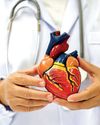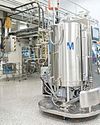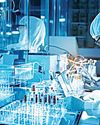What's dampening the GLOBAL AMR BATTLE?
BioSpectrum Asia
|December 2024
Although there have been significant national and worldwide efforts to provide financial incentives for antibiotic research and development, it is still unclear how best to fortify the existing programmes to further spur antibiotic innovation. The incentive programmes in place now are a crucial first step in enhancing the economic viability of antibiotic development. However, it seems like there isn't enough global coordination among all the programmes, which could lead to duplication of effort, funding gaps in the value chain, and the failure to include crucial AMR objectives. Let's dig deeper.

Antimicrobial resistance (AMR) is a growing global concern, with the situation worsening year by year. The speed of developing resistance is at par or, in fact, more than the speed of novel antibiotic development. Most of the big pharmaceutical companies have left antibiotic research due to the high risk of failure and poor return on investment. Antibiotic research is mostly carried out by academic institutes and small- and medium-sized enterprises. However, they lack sufficient funds to take the compounds from early and mid-stage to clinical trials and market.
Insufficient funding remains a major challenge in advancing research on AMR, both in India and globally. The funding landscape for AMR research is characterised by a lack of sustained investment and inadequate financial support from both the public and private sectors. This lack of resources significantly hampers the development of new antibiotics, diagnostic tools, and treatment approaches. In a scenario where countries fail to contain drug resistance, we could face a staggering $1.7 trillion annual reduction in global economic output by 2050, amounting to a 0.88 per cent decrease in GDP. This would not only escalate hospital treatment costs but also adversely affect tourism and domestic hospitality.
An annual investment of $63 billion spent improving access to, and developing new antimicrobials, could generate more than $1.7 trillion in benefits a year by 2050. While $63 billion may sound like a lot of money-in reality, it's less than the world spends on cosmetic surgery, less than video gamers spend on in-game purchases, each year-and it's about an eighth of what the world spends on takeout coffee. These findings are from the recent report from Center for Global Development, based at Washington DC and London, a think tank that uses economic research to reduce global poverty and inequality.
This story is from the December 2024 edition of BioSpectrum Asia.
Subscribe to Magzter GOLD to access thousands of curated premium stories, and 10,000+ magazines and newspapers.
Already a subscriber? Sign In
MORE STORIES FROM BioSpectrum Asia

BioSpectrum Asia
"The next 5-years will see mRNA science evolve beyond infectious disease"
A new survey from Moderna Singapore reveals persistent vaccine hesitancy among older adults in Singapore, even as international travel and year-end gatherings increase the urgency of protection. The findings point to clear opportunities to strengthen public health, including empowering healthcare professionals as trusted messengers and promoting co-administration of vaccines.
4 mins
BioSpectrum Asia Dec 2025
BioSpectrum Asia
No Funding No Vax for TB?
The World Health Organization (WHO)'s latest updates on tuberculosis (TB) released on November 12 reveal significant progress in diagnosis, treatment, and political commitment, but also expose deep vulnerabilities—especially in the South-East Asia Region (SEARO)—related to funding gaps and the uncertain future of novel TB vaccines. SEARO remains the global epicentre of the TB epidemic, carrying more than 45 per cent of the world's TB incidence despite representing only a quarter of the global population.
2 mins
BioSpectrum Asia Dec 2025

BioSpectrum Asia
Australia builds tailored heart pump to transform heart failure care
Despite making up half of the 64 million people living with heart failure, patients with this common form have no access to heart pump treatments and are left with only medication or palliative care.
1 min
BioSpectrum Asia Dec 2025

BioSpectrum Asia
Clinical Research Trends 2026: Hybrid DCTs Set for Surge as Innovation Outpaces Regulatory Hurdles
APAC's openness to innovation, combined with its large population and low trial density, creates strong potential for expanding decentralised clinical trials (DCTs), especially for patients with limited trial access. While regulatory diversity and operational challenges will continue to hinder fully decentralised models, the region is expected to adopt more digital technologies in clinical research. As a result, hybrid DCTs will keep gaining traction, and effective management of digitally collected data will remain a central focus for data science teams.
4 mins
BioSpectrum Asia Dec 2025

BioSpectrum Asia
CSL Seqirus to localise advanced influenza vaccine manufacturing in Saudi Arabia
Australia-based CSL Seqirus and Vaccine Industrial Company have signed a Memorandum of Understanding with the Ministry of Health of Saudi Arabia to enhance the biotechnology sector by accessing advanced cellbased seasonal and pandemic influenza vaccines and localising manufacturing in Saudi Arabia.
1 min
BioSpectrum Asia Dec 2025

BioSpectrum Asia
How Sponsors Could Gain Advantage by Embracing Dose Optimisation in Asia by 2026
In 2026, oncology drug development in Asia may move away from the historical maximum tolerated dose (MTD) paradigm toward evidence-based dose optimisation. Sponsors might consider adopting strategies similar to the FDA's Project Optimus, which emphasises selecting doses that balance efficacy and safety rather than relying solely on toxicity thresholds. Doing so could improve patient outcomes and position companies favourably as regulatory expectations evolve.
1 mins
BioSpectrum Asia Dec 2025

BioSpectrum Asia
Fujifilm launches joint research with National Cancer Center in Japan
Fujifilm Corporation has signed a joint research agreement with the National Cancer Center Japan, a Tokyo-based national institution recognised for its leadership in cancer care and research.
1 min
BioSpectrum Asia Dec 2025

BioSpectrum Asia
Monash spinout RAGE Biotech secures $29 M to advance next-generation RNA therapeutics
Australia's Monash University spinout RAGE Biotech has raised $29 million in Series A funding, marking a major step toward translating RNA-based therapeutics for chronic inflammatory disease into the clinic.
1 min
BioSpectrum Asia Dec 2025

BioSpectrum Asia
Submitting clinical data to the FDA and PDMA: An efficient and compliant approach
In both the US and Japan, regulators provide an extensive set of resources detailing the rules and specifications governing submissions for marketing approval of new drugs and biologics. Fortunately, despite some differences, the regulations concerning clinical data have a surprising amount in common. It is possible that with a solid understanding of the requirements and an adherence to best practices, sponsors can develop some of the same material for submission to both countries.
2 mins
BioSpectrum Asia Dec 2025

BioSpectrum Asia
Regenerative medicines and microbiome health are emerging as exciting frontiers, with Australian companies and researchers pushing into new therapeutic approaches
After more than a year at the helm of AusBiotech, CEO Rebekah Cassidy reflects on her early priorities and the organisation’s ambitions as Australia accelerates its position in the global life sciences economy. In an email interaction on the sidelines of AusBiotech 2025, she highlights the country's progress in mRNA, cell and gene therapy, and radiopharmaceuticals, outlines emerging areas of momentum, and discusses how new partnerships and MoUs are strengthening collaboration across the biotech ecosystem. Rebekah also outlines how AusBiotech is preparing Australia for a more competitive and connected global life sciences economy and the strategic priorities shaping AusBiotech’s next chapter. Edited excerpts:
7 mins
BioSpectrum Asia Dec 2025
Listen
Translate
Change font size

